formerly eScholarship Editions


|
|
|
|
Your request for similar items found 20 book(s). | Modify Search | Displaying 1 - 20 of 20 book(s) | |
| 1. | 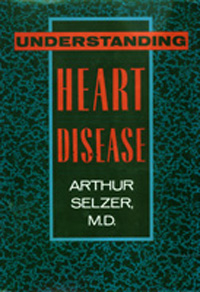 | Title: Understanding heart disease Author: Selzer, Arthur Published: University of California Press, 1992 Subjects: Medicine | Science Publisher's Description: Diseases of the heart are the leading cause of death in the Western world. Health professionals and the general public alike eagerly watch advances in the prevention, diagnosis, and treatment of heart disease. Yet the more spectacular aspects of medical progress in the field are often reported prematurely and their potential benefits exaggerated.Written in clear, accessible language, this book presents an authoritative and balanced picture of how heart diseases are recognized and managed. From his many years of experience, Dr. Selzer believes a well-informed patient can cooperate more successfully with a physician, and his book includes information vital to anyone confronting heart problems and cardiac emergencies. [brief] Similar Items |
| 2. | 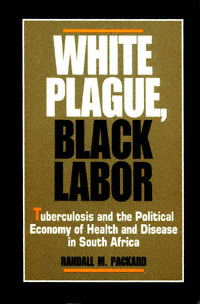 | Title: White plague, black labor: tuberculosis and the political economy of health and disease in South Africa Author: Packard, Randall M 1945- Published: University of California Press, 1989 Subjects: Anthropology | Medicine | Medical Anthropology | African Studies | Politics Publisher's Description: Why does tuberculosis, a disease which is both curable and preventable, continue to produce over 50,000 new cases a year in South Africa, primarily among blacks? In answering this question Randall Packard traces the history of one of the most devastating diseases in twentieth-century Africa, against the background of the changing political and economic forces that have shaped South African society from the end of the nineteenth century to the present. These forces have generated a growing backlog of disease among black workers and their families and at the same time have prevented the development of effective public health measures for controlling it. Packard's rich and nuanced analysis is a significant contribution to the growing body of literature on South Africa's social history as well as to the history of medicine and the political economy of health. [brief] Similar Items |
| 3. | 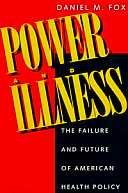 | Title: Power and illness: the failure and future of American health policy Author: Fox, Daniel M Published: University of California Press, 1993 Subjects: Sociology | Medicine | History | American Studies | United States History Publisher's Description: During most of this century, American health policy has emphasized caring for acute conditions rather than preventing and managing chronic illness - even though chronic illness has caused most sickness and death since the 1920s. In this provocative and wide-ranging book, Daniel Fox explains why this has been so and offers a forceful argument for fundamental change in national health care priorities.Fox discusses how ideas about illness and health care, as well as the power of special interest groups, have shaped the ways in which Americans have treated illness. Those who make health policy decisions have increased support for hospitals, physicians, and medical research, believing that people then would become healthier. This position, implemented at considerable cost, has not adequately taken into account the growing burden of chronic disabling illness. While decision makers may have defined chronic disease as a high priority in research, they have not given it such a priority in the financing of health services.The increasing burden of chronic illness is critical. Fox suggests ways to solve this problem without increasing the already high cost of health care - but he does not underestimate the difficulties in such a strategy. Advocating the redistribution of resources within hospital and medical services, he targets those that are redundant or marginally effective.There could be no more timely subject today than American health care. And Daniel Fox is uniquely able to address its problems. A historian of medicine, with knowledge of how hospitals and physicians behave and how health policy is made at government levels, he has extensively researched published and unpublished documents on health care. What he proposes could profoundly affect all Americans. [brief] Similar Items |
| 4. |  | Title: Public health law and ethics: a reader Author: Gostin, Larry O. (Larry Ogalthorpe) Published: University of California Press, 2002 Subjects: Law | Medicine | Health Care Publisher's Description: This incisive selection of government reports, scholarly articles, and court cases is designed to illuminate the ethical, legal, and political issues in the theory and practice of public health. A companion to the internationally acclaimed Public Health Law: Power, Duty, Restraint, this collection encourages debate and discourse about how courts, scholars, and policy makers respond to the salient legal and ethical dilemmas. The excerpts and commentaries in the reader analyze the legal and constitutional foundations of public health, juxtaposing them with the emerging importance of public health ethics and human rights. The book offers a systematic account of public health law, ethics, and human rights in promoting the common good. Gostin provides thoughtful commentary on the field of public health and carefully explains the meaning and importance of each selection. Scholars, legislators, and public health professionals, as well as faculty and students in schools of law, public health, medicine, nursing, government, and health administration, will benefit from the contemporary case studies covering a wide range of topics from bioterrorism to public health genetics. [brief] Similar Items |
| 5. | 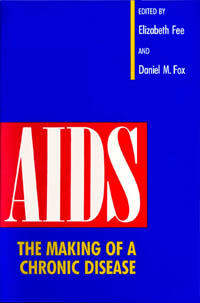 | Title: AIDS: the making of a chronic disease Author: Fee, Elizabeth Published: University of California Press, 1991 Subjects: History | Medicine | United States History | Sociology Publisher's Description: When AIDS was first recognized in 1981, most experts believed that it was a plague, a virulent unexpected disease. They thought AIDS, as a plague, would resemble the great epidemics of the past: it would be devastating but would soon subside, perhaps never to return. By the middle 1980s, however, it became increasingly clear that AIDS was a chronic infection, not a classic plague.In this follow-up to AIDS: The Burdens of History , editors Elizabeth Fee and Daniel M. Fox present essays that describe how AIDS has come to be regarded as a chronic disease. Representing diverse fields and professions, the twenty-three contributors to this work use historical methods to analyze politics and public policy, human rights issues, and the changing populations with HIV infection. They examine the federal government's testing of drugs for cancer and HIV, and show how the policy makers' choice of a specific historical model (chronic disease versus plague) affected their decisions. A powerful photo essay reveals the strengths of women from various backgrounds and lifestyles who are coping with HIV. A sensitive account of the complex relationships of the gay community to AIDS is included. Finally, several contributors provide a sampling of international perspectives on the impact of AIDS in other nations. [brief] Similar Items |
| 6. | 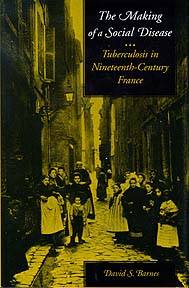 | Title: The making of a social disease;: tuberculosis in nineteenth-century France Author: Barnes, David S Published: University of California Press, 1995 Subjects: History | History and Philosophy of Science | Medicine | European History Publisher's Description: In this first English-language study of popular and scientific responses to tuberculosis in nineteenth-century France, David Barnes provides a much-needed historical perspective on a disease that is making an alarming comeback in the United States and Europe. Barnes argues that French perceptions of the disease - ranging from the early romantic image of a consumptive woman to the later view of a scourge spread by the poor - owed more to the power structures of nineteenth-century society than to medical science. By 1900, the war against tuberculosis had become a war against the dirty habits of the working class.Lucid and original, Barnes's study broadens our understanding of how and why societies assign moral meanings to deadly diseases. [brief] Similar Items |
| 7. |  | Title: Lives at risk: public health in nineteenth-century Egypt Author: Kuhnke, LaVerne Published: University of California Press, 1990 Subjects: Anthropology | Medical Anthropology Publisher's Description: Lives at Risk describes the introduction of Western medicine into Egypt. The two major innovations undertaken by Muhammad Ali in the mid-nineteenth century were a Western-style school of medicine and an international Quarantine Board. The ways in which these institutions succeeded and failed will greatly interest historians of medicine and of modern Egypt. And because the author relates her narrative to twentieth-century health issues in developing countries, Lives at Risk will also interest medical and social anthropologists.The presence of the quarantine establishment and the medical school in Egypt resulted in a rudimentary public health service. Paramedical personnel were trained to provide primary health care for the peasant population. A vaccination program effectively freed the nation from smallpox. But the disease-oriented, individual-care practice of medicine derived from the urban hospital model of industrializing Europe was totally incompatible with the health care requirements of a largely rural, agrarian population. [brief] Similar Items |
| 8. | 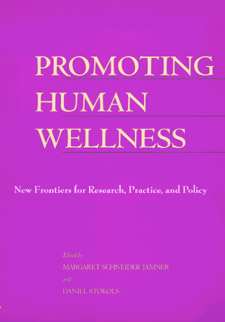 | Title: Promoting human wellness: new frontiers for research, practice, and policy Author: Jamner, Margaret Schneider Published: University of California Press, 2001 Subjects: Medicine | Public Policy | Anthropology | Aging | Education Publisher's Description: This book is a state-of-the-art educational resource on the latest research and public-policy developments in the fields of wellness promotion and disease prevention. Based on award-winning lectures by University of California faculty on nine campuses as part of the Wellness Lectures Program jointly funded by The California Wellness Foundation, Health Net, and the University of California, the volume aims to widen the scope of health care research and policy to promote wellness rather than focus on illness and disease, and to incorporate proactive, interdisciplinary approaches to health care. The volume also contains chapters by distinguished scholars inthe fields of wellness promotion and disease prevention. Many of these articles fall outside the scope of what we conventionally call health promotion, bringing new perspectives to research and policy possibilities. Promoting Human Wellness is organized around core themes such as the importance of disease prevention programs that address multiple health risks, the link between poverty and minority status and disease susceptibility, and the challenge of evaluating health benefits and cost-effectiveness. The articles discuss such timely issues as genetic determinism as a paradigm in wellness promotion, adolescent health promotion and teen pregnancy prevention strategies, racial differences in cancer epidemiology, the California smokers' helpline, strategies for reducing youth violence, HIV/AIDS prevention, domestic violence education and prevention srategies, and the future of women's health research. Presented within the framework of social ecology, several of the chapters in this volume address new ideas and approaches in the wellness field that are only now beginning to be understood such as the social construction of variables including race, class, and gender. Promoting Human Wellness will be essential reading for health practitioners, policymakers, and others seeking to expand the ways we define and achieve health. Keywords: Public health, community health, medicine, nursing, social welfare, health education, health psychology, social ecology, public policy, aging, health promotion. [brief] Similar Items |
| 9. | 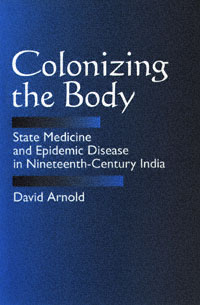 | Title: Colonizing the body: state medicine and epidemic disease in nineteenth-century India Author: Arnold, David 1946- Published: University of California Press, 1993 Subjects: Asian Studies | South Asia | Asian History | Medicine | History Publisher's Description: In this innovative analysis of medicine and disease in colonial India, David Arnold explores the vital role of the state in medical and public health activities, arguing that Western medicine became a critical battleground between the colonized and the colonizers.Focusing on three major epidemic diseases - smallpox, cholera, and plague - Arnold analyzes the impact of medical interventionism. He demonstrates that Western medicine as practiced in India was not simply transferred from West to East, but was also fashioned in response to local needs and Indian conditions.By emphasizing this colonial dimension of medicine, Arnold highlights the centrality of the body to political authority in British India and shows how medicine both influenced and articulated the intrinsic contradictions of colonial rule. [brief] Similar Items |
| 10. |  | Title: Policies, plans, & people: foreign aid and health development Author: Justice, Judith Published: University of California Press, 1989 Subjects: Anthropology | Art and Architecture Publisher's Description: Judith Justice uses an interdisciplinary approach to show how anthropologists and planners can combine their expertise to make health care programs culturally compatible with the populations they serve. Similar Items |
| 11. | 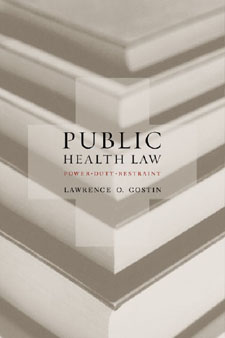 | Title: Public health law: power, duty, restraint Author: Gostin, Larry O. (Larry Ogalthorpe) Published: University of California Press, 2001 Subjects: Law | Medicine | Public Policy Publisher's Description: Gostin's timely book offers the first systematic definition and theory of public health law. Basing his definition on a broad notion of the government's inherent responsibility to advance the population's health and well-being, he develops a rich understanding of the government's fundamental powers and duties. By analyzing constitutional powers and limits, as well as statutory, administrative, and tort law, Public Health Law vividly shows how law can become a potent tool for the realization of a healthier and safer population. [brief] Similar Items |
| 12. | 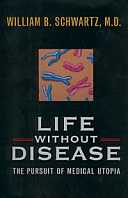 | Title: Life without disease: the pursuit of medical utopia Author: Schwartz, William B 1922- Published: University of California Press, 1998 Subjects: Science | Medicine | Economics and Business | History and Philosophy of Science | Public Policy Publisher's Description: The chaotic state of today's health care is the result of an explosion of effective medical technologies. Rising costs will continue to trouble U.S. health care in the coming decades, but new molecular strategies may eventually contain costs. As life expectancy is dramatically extended by molecular medicine, a growing population of the aged will bring new problems. In the next fifty years genetic intervention will shift the focus of medicine in the United States from repairing the ravages of disease to preventing the onset of disease. Understanding the role of genes in human health, says Dr. William B. Schwartz, is the driving force that will change the direction of medical care, and the age-old dream of life without disease may come close to realization by the middle of the next century. Medical care in 2050 will be vastly more effective, Schwartz maintains, and it may also be less expensive than the resource-intensive procedures such as coronary bypass surgery that medicine relies on today.Schwartz's alluring prospect of a medical utopia raises urgent questions, however. What are the scientific and public policy obstacles that must be overcome if such a goal is to become a reality? Restrictions on access imposed by managed care plans, the corporatization of charitable health care institutions, the increasing numbers of citizens without health insurance, the problems with malpractice insurance, and the threatened Medicare bankruptcy - all are the legacy of medicine's great progress in mastering the human body and society's inability to assimilate that mastery into existing economic, ethical, and legal structures. And if the average American life span is 130 years, a genuine possibility by 2050, what social and economic problems will result?Schwartz examines the forces that have brought us to the current health care state and shows how those same forces will exert themselves in the decades ahead. Focusing on the inextricable link between scientific progress and health policy, he encourages a careful examination of these two forces in order to determine the kind of medical utopia that awaits us. The decisions we make will affect not only our own care, but also the system of care we bequeath to our children. [brief] Similar Items |
| 13. | 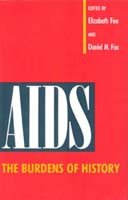 | Title: AIDS: the burdens of history Author: Fee, Elizabeth Published: University of California Press, 1988 Subjects: Medicine | Science Publisher's Description: The AIDS epidemic has posed more urgent historical questions than any other disease of modern times. How have societies responded to epidemics in the past? Why did the disease emerge when and where it did? How has it spread among members of particular groups? And how will the past affect the future - in particular, what does the history of medical science and public health tell us about our ability to control the epidemic and eventually to cure the disease?Historical methods of inquiry change, and people who use these methods often disagree on theory and practice. Indeed, the contributors to this volume hold a variety of opinions on controversial historiographic issues. But they share three important principles: cautious adherence to the "social constructionist" view of past and present; profound skepticism about historicism's idea of progress; and wariness about "presentism," the distortion of the past by seeing it only from the point of view of the present.Each of the twelve essays addresses an aspect of the burdens of history during the AIDS epidemic. By "burdens" is meant the inescapable significance of events in the past for the present. All of these events are related in some way to the current epidemic and can help clarify the complex social and cultural responses to the crisis of AIDS.This collection illuminates present concerns directly and forcefully without sacrificing attention to historical detail and to the differences between past and present situations. It reminds us that many of the issues now being debated - quarantine, exclusion, public needs and private rights - have their parallels in the past. This will be an important book for social historians and general readers as well as for historians of medicine. [brief] Similar Items |
| 14. | 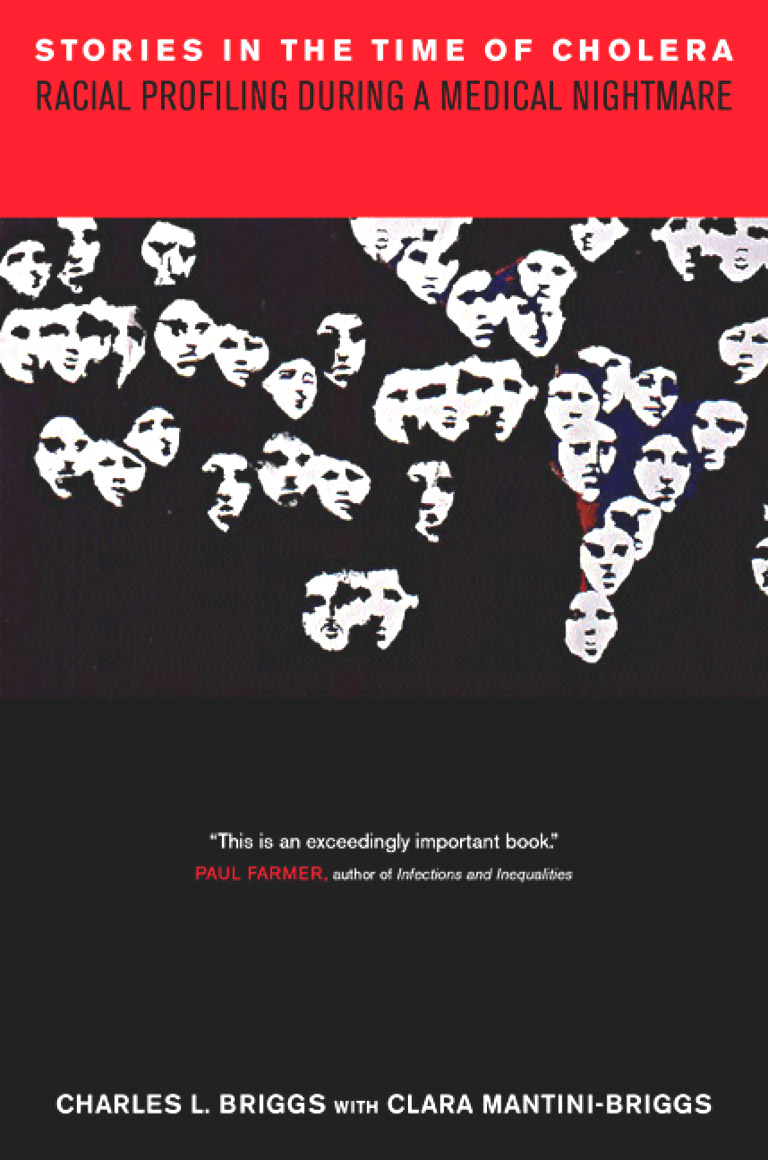 | Title: Stories in the time of cholera: racial profiling during a medical nightmare Author: Briggs, Charles L 1953- Published: University of California Press, 2003 Subjects: Anthropology | Latin American Studies | Ethnic Studies | Disease | Medical Anthropology Publisher's Description: Cholera, although it can kill an adult through dehydration in half a day, is easily treated. Yet in 1992-93, some five hundred people died from cholera in the Orinoco Delta of eastern Venezuela. In some communities, a third of the adults died in a single night, as anthropologist Charles Briggs and Clara Mantini-Briggs, a Venezuelan public health physician, reveal in their frontline report. Why, they ask in this moving and thought-provoking account, did so many die near the end of the twentieth century from a bacterial infection associated with the premodern past? It was evident that the number of deaths resulted not only from inadequacies in medical services but also from the failure of public health officials to inform residents that cholera was likely to arrive. Less evident were the ways that scientists, officials, and politicians connected representations of infectious diseases with images of social inequality. In Venezuela, cholera was racialized as officials used anthropological notions of "culture" in deflecting blame away from their institutions and onto the victims themselves. The disease, the space of the Orinoco Delta, and the "indigenous ethnic group" who suffered cholera all came to seem somehow synonymous. One of the major threats to people's health worldwide is this deadly cycle of passing the blame. Carefully documenting how stigma, stories, and statistics circulate across borders, this first-rate ethnography demonstrates that the process undermines all the efforts of physicians and public health officials and at the same time contributes catastrophically to epidemics not only of cholera but also of tuberculosis, malaria, AIDS, and other killers. The authors have harnessed their own outrage over what took place during the epidemic and its aftermath in order to make clear the political and human stakes involved in the circulation of narratives, resources, and germs. [brief] Similar Items |
| 15. | 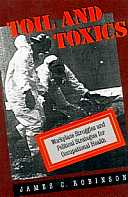 | Title: Toil and toxics: workplace struggles and political strategies for occupational health Author: Robinson, James C. (James Claude) 1953- Published: University of California Press, 1991 Subjects: Environmental Studies | Labor Studies | Sociology | Public Policy | Economics and Business Similar Items |
| 16. | 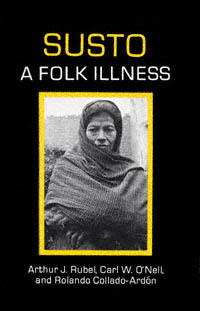 | Title: Susto, a folk illness Author: Rubel, Arthur J Published: University of California Press, 1984 Subjects: Anthropology | Medical Anthropology | Latin American Studies | Psychology Publisher's Description: Widespread throughout Latin America, susto is a folk illness associated with a broad array of symptoms. It is considered by susceptible populations to be a sickness caused by the separation of soul and body which is precipitated by a supernatural force. Most studies of culture-bound diseases have relied on descriptive approaches that focus on pathologies derived from medical textbooks. This study takes an interdisciplinary approach, looking for explanations of susto in the interaction of social, physiological, and psychological factors. [brief] Similar Items |
| 17. |  | Title: Ethics in an epidemic: AIDS, morality, and culture Author: Murphy, Timothy F 1955- Published: University of California Press, 1994 Subjects: Philosophy | Sociology | Ethics | Medicine | Social Problems Publisher's Description: AIDS strikes most heavily at those already marginalized by conventional society. With no immediate prospect of vaccination or cure, how can liberty, dignity, and reasoned hope be preserved in the shadow of an epidemic? In this humane and graceful book, philosopher Timothy Murphy offers insight into our attempts - popular and academic, American and non-American, scientific and political - to make moral sense of pain.Murphy addresses the complex moral questions raised by AIDS for health-care workers, politicians, policy makers, and even people with AIDS themselves. He ranges widely, analyzing contrasting visions of the origin and the future of the epidemic, the moral and political functions of obituaries, the uncertain value of celebrity involvement in anti-AIDS education, the functional uses of AIDS in the discourse of presidential campaigns, the exclusionary function of HIV testing for immigrants, the priority given to AIDS on the national health agenda, and the hypnotic publicity given to "innocent" victims.Murphy's discussions of the many social and political confusions about AIDS are unified by his attempt to articulate the moral assumptions framing our interpretations of the epidemic. By understanding those assumptions, we will be in a better position to resist self-serving and invidious moralizing, reckless political response, and social censure of the sick and the dying. [brief] Similar Items |
| 18. |  | Title: Smallpox: the fight to eradicate a global scourge Author: Koplow, David A 1951- Published: University of California Press, 2003 Subjects: Politics | American Studies | Public Policy | Disease Publisher's Description: Though smallpox was eradicated from the planet two decades ago, recent terrorist acts have raised the horrific possibility that rogue states, laboratories, or terrorist groups are in possession of secret stockpiles of the virus that causes the disease, and may be preparing to unleash it on target populations. Because it is a far deadlier killer than other biological warfare agents such as anthrax, and because the universal vaccination against smallpox was halted decades ago, a smallpox attack today would be nothing short of catastrophic. This clear, authoritative study looks at the long and fascinating history of the virus, with an informative overview of the political, biological, environmental, medical, and legal issues surrounding the question of whether or not the virus should be exterminated. The only two known samples of the virus are currently stored in Atlanta and Russia. The World Health Organization has repeatedly scheduled their destruction - an action that would rid the planet of all publicly acknowledged smallpox strains forever. Opponents of this plan argue that by destroying these last samples we are denying the possibility that this unique virus could be turned to beneficial purposes in basic scientific research. Others see the stockpile as part of a deterrent against future germ attacks. Proponents of prompt eradication argue that scientists have already learned all they can from this particular virus, and that by destroying the stockpile we are preventing it from ever falling into the wrong hands. As a thirty-year veteran of arms control issues, David Koplow is uniquely suited to provide readers with an informed and well-considered understanding of the complexities involved in the handling of this deadly virus. [brief] Similar Items |
| 19. |  | Title: Experiencing politics: a legislator's stories of government and health care Author: McDonough, John E. (John Edward) Published: University of California Press, 2000 Subjects: Politics | Public Policy | Medicine Publisher's Description: John E. McDonough affords a rare glimpse into the practice of state politics in this insider's account of the fascinating interface between political science and real-life politics. A member of the Massachusetts House of Representatives for thirteen years and a skilled storyteller, McDonough eloquently weaves together stories of politics and policy with engaging theoretical models in a way that illuminates both the theory and the practice. By providing a link between scholarship and the world of experience, he communicates much about the essence of representative democracy. In the process, he demonstrates how politics extend beyond the public sphere into many aspects of life involving diverse values and interests. McDonough describes the nature of conflict, the role of interests, agenda setting, the nature and pace of change, the use of language, and more. Accessible, insightful, and original, his stories touch on a broad range of issues - including health care politics, campaigns, and elections; a street gang called the X-men; the death penalty; campaign finance reform, and tenants versus landlords. To the author, politics is everywhere and political dynamics are universal. While the setting for this book is one legislature, the lessons and insights are intended for everyone. [brief] Similar Items |
| 20. | 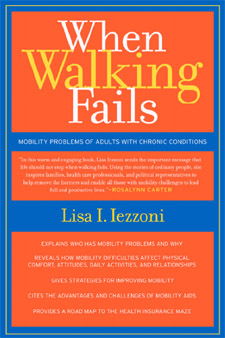 | Title: When walking fails: mobility problems of adults with chronic conditions Author: Iezzoni, Lisa I Published: University of California Press, 2003 Subjects: Medicine | Health Care | Sociology | Public Policy Publisher's Description: Roughly one in ten adult Americans find their walking slowed by progressive chronic conditions like arthritis, back problems, heart and lung diseases, and diabetes. In this passionate and deeply informed book, Lisa I. Iezzoni describes the personal experiences of and societal responses to adults whose mobility makes it difficult for them to live as they wish - partly because of physical and emotional conditions and partly because of persisting societal and environmental barriers. Basing her conclusions on personal experience, a wealth of survey data, and extensive interviews with dozens of people from a wide social spectrum, Iezzoni explains who has mobility problems and why; how mobility difficulties affect people's physical comfort, attitudes, daily activities, and relationships with family and friends throughout their communities; strategies for improving mobility; and how the health care system addresses mobility difficulties, providing and financing services and assistive technologies. Iezzoni claims that, although strategies exist to improve mobility, many people do not know where to turn for advice. She addresses the need to inform policymakers about areas where changes will better accommodate people with difficulty walking. This straightforward and engaging narrative clearly demonstrates that improving people's ability to move freely and independently will enhance overall health and quality of life, not only for these persons, but also for society as a whole. [brief] Similar Items |